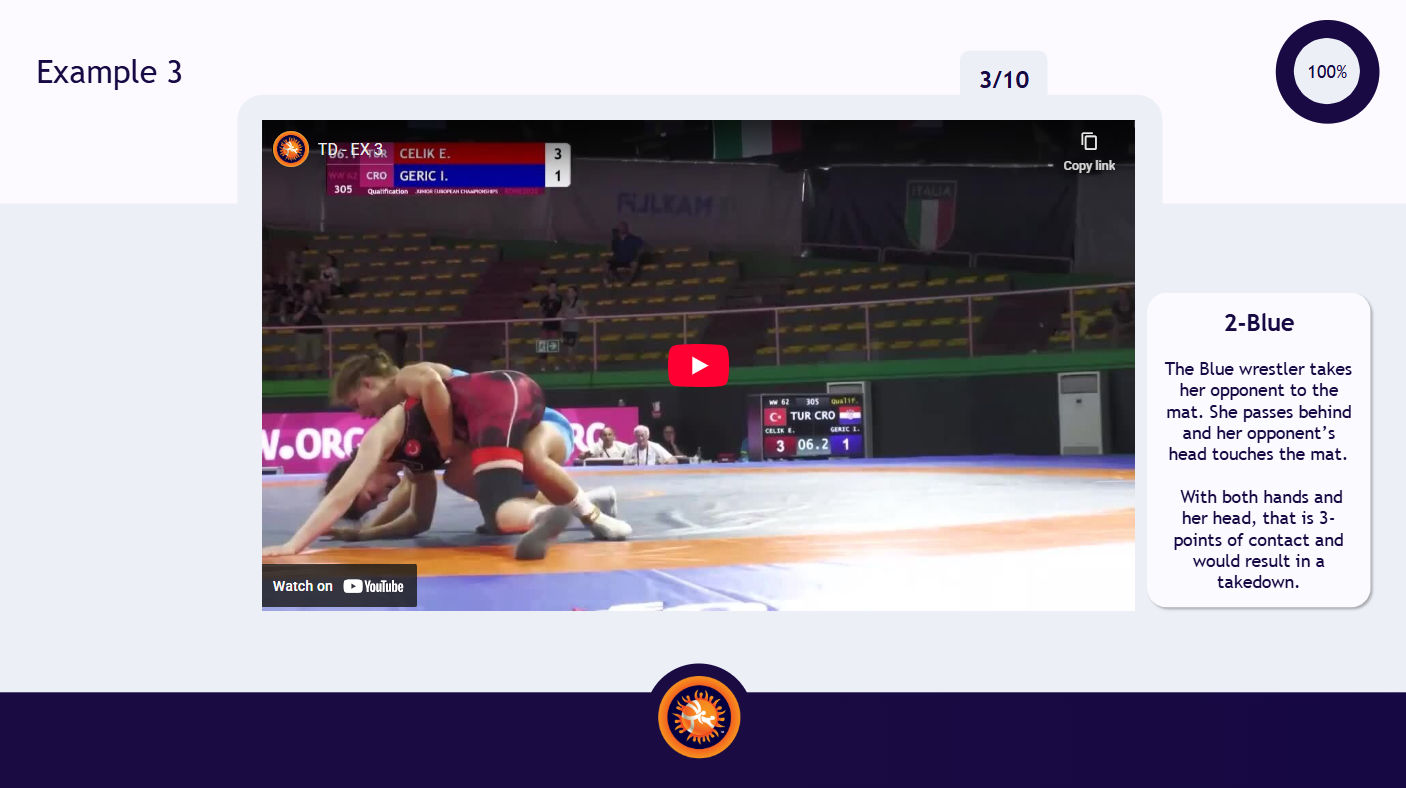Abuladze falls short against Dalkhani, yet again
Thursday, February 23, 2023 - 19:24 By Eric Olanowski & Vinay Siwach

ALEXANDRIA, Egypt (February 23) -- Leri ABULADZE (GEO)'s quest to find a win against Meysam DALKHANI (IRI) will have to continue for now. In the space of 16 months, he has faced Dalkhani twice and lost both bouts. Both are ever so dramatic.
Back in 2021, Abuladze led 4-3 when Dalkhani forced a stepout and a failed challenge from Abuladze gave him a 5-4 win in the final of the 63kg at the World Championships in Oslo. The bout in Alexandria on Thursday, a 63kg final, albeit not of a World Championships, saw Dalkhani pull off a victory by the thinnest of margins once again.
No doubt Dalkhani had to dig deep to pick up the win but it was the Iranian’s conditioning late in the second period that helped him win.
Dalkhani made the early inroads with a 5-0 lead at the break, but after giving up an inactivity point and three consecutive guts, he watched his lead evaporate and turn into a two-point advantage for Abuladze who came out firing in the second period.
As the referee called both wrestlers to the center after that exchange, Abuladze looked a relieved man.
In Oslo, Abuladze had one minute to score for a win. Now, he had to defend for a minute. But like that final, he failed.
Dalkhani scored a stepout to cut the lead to just one point and needing a takedown at 7-6 with a minute to go, he put on the burners. The pair traded heavy exchanges in the 60-second sprint, but it was a re-drag with ten seconds left that pushed Abuladze to give up a takedown and Dalkhani to the 63kg gold.
Not only in the final, the 2021 world champion, making a comeback since that freak elbow injury at the Bolat Turlykhanov Cup in Almaty last year, looked composed throughout the day.
Using his strong gut wrench, he defeated Syimyk MAKHMUDOV (KGZ) 7-0 in the opening bout and kept fellow world champion from Oslo, Victor CIOBANU (MDA), quiet in a 4-0 win using an aggressive approach in the second period. The semifinal was a quieter affair as Madiyar MALTEKBAYEV (KAZ) thought he had it until Dalkhani won 2-1.
Another Oslo world champion, Mohammadhadi SARAVI (IRI) joined Dalkhani at the top of the podium on Thursday as he captured the gold medal at 97kg after beating Roberti KOBLIASHVILI (GEO).
The gold medal winners at the four Ranking Series events this year will receive 1500 Swiss Francs while the silver medalists will get 750 Swiss Francs. The two bronze medalists in each weight class will receive 500 Swiss Francs each.
Saravi won the gold after Kobliashvili pulled out injured in the final. But the day was nothing short of testing for the world bronze medalist from Belgrade.
Earlier in the morning, Saravi began with a 2-0 win over Giorgi MELIA (GEO), followed that with a 5-2 victory over Tamas LEVAI (HUN) who won silver in Zagreb and Artur OMAROV (CZE) 5-2 in the semifinal.
 Amangali BEKBOLATOV (KAZ), right, wrestles Marlan MUKASHEV (KAZ) in the 55kg final. (Photo: UWW / Kadir Caliskan)
Amangali BEKBOLATOV (KAZ), right, wrestles Marlan MUKASHEV (KAZ) in the 55kg final. (Photo: UWW / Kadir Caliskan)
Apart from Iran, Kazakhstan and Georgia were the most successful nations on the first day of the Ibrahim Moustafa Ranking Series, the second of the year after the Zagreb Open, with four finalists each.
At 55kg, Amangali BEKBULATOV (KAZ) won the gold over compatriot Marlan MUKASHEV (KAZ), who had defeated two-time world silver medalist Nugzari TSURTSUMIA (GEO) in a wild 13-4 victory. But he failed to go past Bekbolatov who won 6-1 in the final.
In an early exchange to kick off the gold medal match, Bekbolatov used an aggressive left-side arm drag and picked up the first takedown of the match. In one continuous swopping motion, he linked together a back arching throw on the edge of the circle and controlled the bout with a six-point cushion.
Bekbolatov stayed technically sound in the final four minutes focusing on shutting down Mukashev’s offense by controlling the left side of the body. This game plan worked to perfection, as the only point he surrendered in the gold-medal bout was a failed challenge, which in fact was the only point he gave up in his three bouts.
After he closed out the scoreless second period, Bekbolatov won his first Ranking Series title as he finished with a silver medal in Istanbul last year. But he went a step further by winning the gold in his season-opening international tournament.
 Merey BEKENOV (KAZ) lifts Sailike WALIHAN (CHN) for a throw. (Photo: UWW / Kadir Caliskan)
Merey BEKENOV (KAZ) lifts Sailike WALIHAN (CHN) for a throw. (Photo: UWW / Kadir Caliskan)
Merey BEKENOV (KAZ) was the second wrestler from Kazakhstan to win the gold medal as he stole the gold from Joni KHETSURIANI (GEO) in the 67kg final.
The two matched each other move-to-move with the Kazah giving up aninactivity point and a gut wrench in the first period but scored on the same sequence and grabbed the criteria win against his Georgian opponent.
Bekenov would be proud of his campaign in Alexandria as he scored a 7-1 win over Olympic bronze medalist Sailike WALIHAN (CHN) followed by a massive 9-7 win over HUSIYUETU (CHN) in the semifinal. Hasiyuetu was fresh off a gold-medal-winning performance in Zagreb including a win over Olympic champion Luis ORTA (CUB)
 Lasha GOBADZE (GEO) launches Ali CENGIZ (TUR) for a four-point throw in the 87kg final. (Photo: UWW / Kadir Caliksan)
Lasha GOBADZE (GEO) launches Ali CENGIZ (TUR) for a four-point throw in the 87kg final. (Photo: UWW / Kadir Caliksan)
While other Georgians failed to win the gold, Lasha GOBADZE (GEO) at 87kg saved the day for his country with a classic performance in the final to beat Ali CENGIZ (TUR) 10-1.
Gobadze was clear in his intentions, and those were to close out the bout early. He quickly jumped out to an 5-0 lead, scoring a four-point throw and an inactivity point. Despite giving up a point after his leg-foul challenge was wrong, Gobadze got a second shot on top and again tossed Cengiz for four to close out the match, 10-1.
 Kerem KAMAL (TUR) won his 60kg final against Yernar FIDAKHMETOV (KAZ) 9-0. (Photo: UWW / Kadir Caliskan)
Kerem KAMAL (TUR) won his 60kg final against Yernar FIDAKHMETOV (KAZ) 9-0. (Photo: UWW / Kadir Caliskan)
Showman Kamal
There is very little someone can dislike about Kerem KAMAL (TUR) on the mat. He has the utmost respect for his opponent, wrestles squeaky clean, and wins with a lot of class. This was on display on Thursday as Kamal raced to a season-opening gold medal which sets the tone for the defending European champion.
Wrestling against Yernar FIDAKHMETOV (KAZ) in the 60kg final, Kamal earned an early shot in par terre and took full advantage of it. He quickly jumped out to a 7-0 lead against his Kazakh opponent, scoring the inactivity point, a pair of two-point correct throws, and a two-point leg foul.
After a 90-second break to adjust Kamal’s scoring sequence due to a challenge, he then jumped out to the left side of Fidakhmetov and ended the bout with a third correct throw of the match.
His power was on display all through the day be it the 9-0 opening win against Razvan ARNAUT (ROU) or the calm 5-2 win over Liguo CAO (CHN) in the quarterfinals. The young Nurmukhammet ABDULLAEV (KGZ) suffered an 8-0 beating at the hands of Kamal in the semifinals.
 Abdellatif MOHAMED (EGY) won the 130kg gold in front of his home crowd. (Photo: UWW / Kadir Caliskan)
Abdellatif MOHAMED (EGY) won the 130kg gold in front of his home crowd. (Photo: UWW / Kadir Caliskan)
Hero at home
Abdellatif MOHAMED (EGY) has already set a benchmark for the local Egypt wrestlers at the tournament by winning the gold medal at 130kg in the final bout of the evening. He defeated Tokyo Olympian Alin ALEXUC CIURARIU (ROU), 3-0, to take the gold medal.
While the field missed Riza KAYAALP (TUR) and Amin MIRZAZADEH (IRI) from the original entries, Mohamed made sure he makes the most of this opportunity that too in front of his home crowd.
Nothing seemed to work for Ciurariu who was blanked by a solid defensive performance by Mohamed who scored the two activity points and a pushout.
With a big women's squad entered for Egypt, the girls will like to keep the trend of winning the medal at home going for the rest of the tournament.
RESULTS
55kg
GOLD - Amangali BEKBOLATOV (KAZ) df. Marlan MUKASHEV (KAZ), 6-1
BRONZE - Iskhar KURBAYEV (KAZ) df. Nugzari TSURTSUMIA (GEO), 7-3
BRONZE - Denis MIHAI (ROU) df. Sardarbek KONUSHBAEV (KGZ), via fall
60kg
GOLD - Kerem KAMAL (TUR) df. Yernar FIDAKHMETOV (KAZ), 9-0
BRONZE - Haithem MAHMOUD (EGY) df. Haodong TAN (CHN), 7-3
BRONZE - Razvan ARNAUT (ROU) df. Nurmukhammet ABDULLAEV (KGZ), 3-1
63kg
GOLD - Meysam DALKHANI (IRI) df. Leri ABULADZE (GEO), 8-7
BRONZE - Dastan ZARLYKHANOV (KAZ) df. Mukhamedali MAMURBEK (KAZ), 14-4
BRONZE - Syimyk MAKHMUDOV (KGZ) df. Madiyar MALTEKBAYEV (KAZ), 9-0
67kg
GOLD - Merey BEKENOV (KAZ) df. Joni KHETSURIANI (GEO), 3-3
BRONZE - Razzak BEISHEKEEV (KGZ) df. ASHU (IND), 8-0
BRONZE - HUSIYUETU (CHN) df. Moustafa ALAMELDIN (EGY), 3-2
87kg
GOLD - Lasha GOBADZE (GEO) df. Ali CENGIZ (TUR), 10-1
BRONZE - Gurami KHETSURIANI (GEO) df. A. AZISBEKOV (KGZ), 6-5
BRONZE - Alex KESSIDIS (SWE) df. Sunil KUMAR (IND), 9-0
97kg
GOLD - Mohammadhadi SARAVI (IRI) df. Roberti KOBLIASHVILI (GEO), via inj. def.
BRONZE - Artur OMAROV (CZE) df. Giorgi MELIA (GEO), 9-4
BRONZE - Markus RAGGINGER (AUT) df. Olzhas SYRLYBAY (KAZ), 5-1
130kg
GOLD - Abdellatif MOHAMED (EGY) df. Alin ALEXUC CIURARIU (ROU), 3-0
BRONZE - Zviadi PATARIDZE (GEO) df. Salaheldin ABBAS (EGY), 8-0
BRONZE - Alimkhan SYZDYKOV (KAZ) df. Roman KIM (KGZ), 5-1



Share your thoughts.
Comments